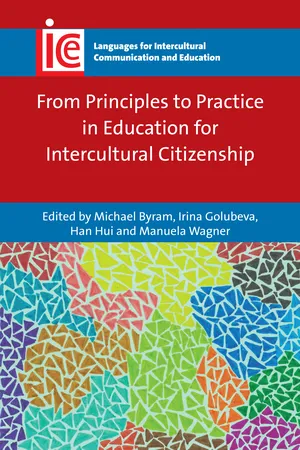
From Principles to Practice in Education for Intercultural Citizenship
- English
- ePUB (mobile friendly)
- Available on iOS & Android
From Principles to Practice in Education for Intercultural Citizenship
About this book
The contributors to this volume have collaborated to present their work on introducing competences in intercultural communication and citizenship into foreign language education. The book examines how learners and teachers think about citizenship and interculturality, and shows how teachers and researchers from primary to university education can work together across continents to develop new curricula and pedagogy. This involves the creation of a new theory of intercultural citizenship and a procedure for implementation. The book is written by teacher researchers who aim to help other teachers, and concludes with reflections on the lessons they have learnt which will help others to implement these ideas in their own practice. The book is essential reading for foreign language educators and researchers, students in pre-service teacher training and teachers in in-service training.
Frequently asked questions
- Essential is ideal for learners and professionals who enjoy exploring a wide range of subjects. Access the Essential Library with 800,000+ trusted titles and best-sellers across business, personal growth, and the humanities. Includes unlimited reading time and Standard Read Aloud voice.
- Complete: Perfect for advanced learners and researchers needing full, unrestricted access. Unlock 1.4M+ books across hundreds of subjects, including academic and specialized titles. The Complete Plan also includes advanced features like Premium Read Aloud and Research Assistant.
Please note we cannot support devices running on iOS 13 and Android 7 or earlier. Learn more about using the app.
Information
Table of contents
- Cover-Page
- Half-Title
- Series
- Title
- Copyright
- Contents
- Foreword
- Acknowledgements
- Contributors
- Introduction
- Section 1: The Baseline: Learners’ and Teachers’ Perceptions of Intercultural Citizenship
- Section 2: Teachers Cooperating
- Section 3: Learners Cooperating
- Reflections: Learning from the Challenges and Seeking Ways Forward
- Index